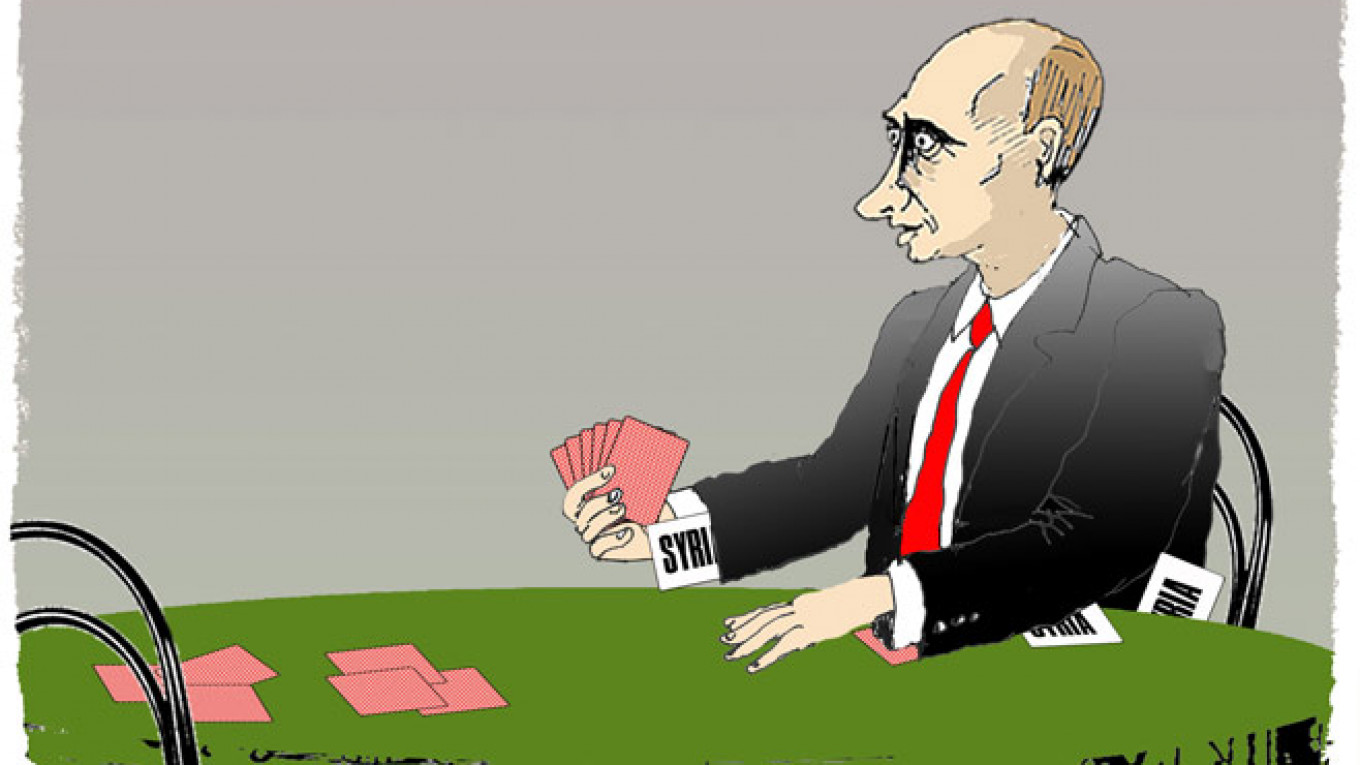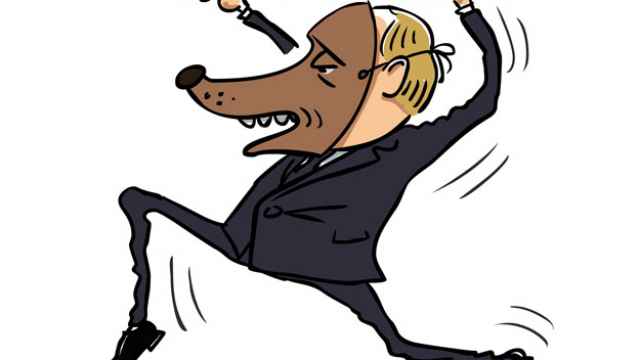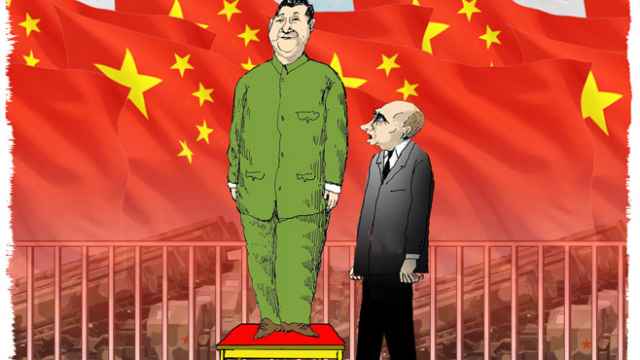During an acute crisis, international politics often resembles a game of "Who blinked first?" It seems that the West has once again blinked first, this time over the Syrian crisis. Washington had issued stern warnings to Russia almost daily over the past two weeks in response to media reports that Moscow was rapidly expanding its military presence in Syria.
Washington rightly warned Moscow that potentially explosive incidents could result if both Russian and Western coalition military aircraft were to occupy Syrian airspace simultaneously.
Moscow responded exactly as it did during the Ukrainian crisis — by smirking and denying the presence of Russian forces while simultaneously deploying an air base near Latakia that U.S. officials claim now includes several Su-30 combat aircraft. Russia even equipped the base with an anti-aircraft missile system — despite the fact that the Islamic State has no air force.
Washington lost its nerve as a result. U.S. military chiefs agreed to speak by telephone with their Russian counterparts for the first time since the crisis in Ukraine began. However, the Russians did not admit to having a military presence in Syria.
As a result, U.S. Secretary of Defense Ashton Carter spent a full hour discussing "the need to coordinate bilateral and multilateral efforts to combat international terrorism" with Russian Defense Minister Sergei Shoigu — as the Defense Ministry's official spokesperson described the conversation. After that, what was the value of the U.S. warnings that Russian military support for the regime of Syrian President Bashar Assad would only deepen the Syrian crisis?
That's not all. U.S. Secretary of State John Kerry said, "The president believes that a military-to-military conversation is an important next step. It will help to define some of the different options that are available to us." Kerry added the caveat that Moscow and Washington hold fundamentally different positions. But then, what is the purpose of negotiating, if not to bring opposing positions closer together?
Russian Foreign Ministry spokeswoman Maria Zakharova happily responded: "We have never refused to hold a dialogue with the United States, and we are open to one now on all issues of mutual interest, including Syria."
Even before the talks began, the West seemed to soften its position on the most sensitive issue: the attitude toward Assad's regime. Kerry immediately announced that Russia and Iran must persuade the Syrian ruler to negotiate his departure from power with the moderate opposition forces. However, Kerry added the concession that the U.S. does not demand that they set a specific day or month for Assad's departure. That opened the door for such negotiations to drag on indefinitely.
The final touch to that picture was a report by German newspaper Bild am Sonntag that a CIA delegation met with Russia's Foreign Intelligence Service last week in Moscow to discuss bilateral cooperation on Syria. The newspaper reports that Washington plans to use intelligence activity to support Moscow's military actions against the Islamic State in Syria.
I honestly doubt that such a meeting ever took place, but if it has, it means that such cooperation has already begun. If it never happened, it is worth speculating as to who leaked this misinformation. I doubt it was Washington.
Thus, Moscow was able to at least start breaking out of its international isolation that had resulted from its intervention in Ukraine. By raising the stakes in Syria, the Kremlin has achieved the status of a major player that is indispensable to the West. Moscow will first push for negotiations on Assad's departure, then finagle an agreement limiting Russia's supply of weapons to the Syrian army, and so on ad infinitum.
It is a nearly exact replay of how Moscow cunningly orchestrated the destruction of Syria's chemical weapons. It will require many months of effort, but one fine day the Russian representative will demand payback for his country's invaluable services — namely, by suggesting that the West forget about Crimea.
In any case, President Vladimir Putin will not have to feel bored sitting alone in New York as he did when he attended the G20 meeting in Australia. The world's delegates are certain to listen attentively to his speech before the UN General Assembly on Sept. 28.
I have no doubt that Foreign Minister Sergei Lavrov and Defense Minister Sergei Shoigu reported to Putin in recent days that, as expected, the West turned out to be more bark than bite. The West probably impressed the Kremlin with its determination when it deployed military forces to the Baltic states, Poland and Romania, but it took a step backward by showing that, unlike Putin, it is not prepared to risk its soldiers' lives in Syria.
Unfortunately, the West's lack of resolve could embolden Moscow toward further adventurism. After all, the Kremlin is convinced it has the right to use its soldiers' lives in order to strengthen Russia's status as a superpower.
The West cannot seem to switch gears and understand that the new Cold War is here to stay. The question now is not whether or not to hold talks with Russia, but to the contrary, how to ensure military security for both sides under current conditions.
However, to achieve that the West has no choice but to speak in direct, unequivocal language that Putin can understand — language that does not allow for conflicting interpretations. And that requires political willpower.
Apparently, that is a task for future Western leaders because today's are clearly failing to cope.
Alexander Golts is deputy editor of the online newspaper Yezhednevny Zhurnal.
A Message from The Moscow Times:
Dear readers,
We are facing unprecedented challenges. Russia's Prosecutor General's Office has designated The Moscow Times as an "undesirable" organization, criminalizing our work and putting our staff at risk of prosecution. This follows our earlier unjust labeling as a "foreign agent."
These actions are direct attempts to silence independent journalism in Russia. The authorities claim our work "discredits the decisions of the Russian leadership." We see things differently: we strive to provide accurate, unbiased reporting on Russia.
We, the journalists of The Moscow Times, refuse to be silenced. But to continue our work, we need your help.
Your support, no matter how small, makes a world of difference. If you can, please support us monthly starting from just $2. It's quick to set up, and every contribution makes a significant impact.
By supporting The Moscow Times, you're defending open, independent journalism in the face of repression. Thank you for standing with us.
Remind me later.







